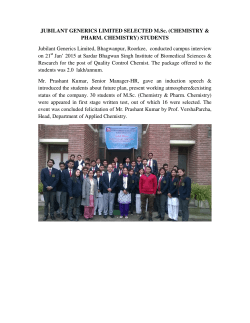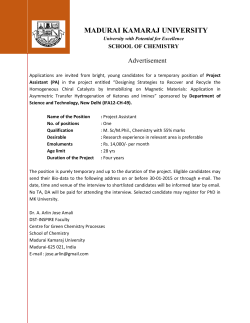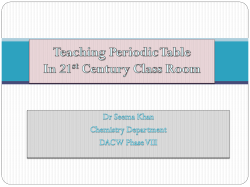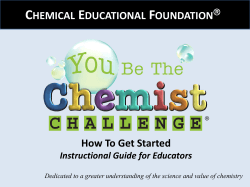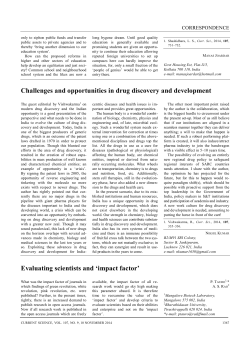
Quality Practical Teaching New Perspective
Quality Practical Teaching New Perspective: A Panacea for Science Education in Cross River State, Nigeria Henshaw Henrietta Nta College of Education Akampa, Cross River State (Nigeria) henshawhenrietta@gmail.com 1. Introduction The need to improve the quality of science teaching and learning so that learners develop scientific literacy to cope with the demand of science and technology growth has been the yearning of every st nation in 21 century. Zuofa [2007] observed that education system in Nigeria is too bookish and there is existing gap between the school and industries. In this regard the practical works in school was developed and is termed as essential component in the teaching of sciences. Quality practical training is achieved when it is focused on the skilled needed in the industry and research. Hafstien and Lunette [2007]. The laboratory as a teaching device has been perceived as important by science teachers because of it usefulness in helping students learn. The importance of practical work in science teaching is widely accepted. It is acknowledge that good quality practical work promotes the engagement and interest of the learners as well as developing a range of skills, science knowledge and conceptual understanding. Many research studies have been conducted to investigate educational effectiveness of practical work in science education in facilitating the attainment of cognitive effectiveness and practiced goals. This studies have been critically and extensively reviewed in literature [Hofstein, Lunetta and Clough [2007] [Hodson 2008, Hofstein and Lunetta, 2004 Clough [2007] from these review, it is clear in general that science laboratory has been given a distinctive role in science education. [Yinusa 2012], recorded the work of Mamoik Naaman which criticized laboratory work and claimed that it is unproductive and confusing since it is very often used without any clearly thought-out purpose and he called on more emphasis on what student are actually doing in the laboratory. Tobin [1990] opined that laboratory activities appear as a way to learn with understanding and at the same time engage in a process of constructing knowledge by doing science. He therefore suggested that meaningful learning is possible in laboratory if students are given the opportunities to manipulate equipment and materials in order to be able to construct their knowledge of phenomenon and relate scientific concepts. Despite these, it is generally believe that schools are not doing enough of quality practical work. Perhaps is the reason for most of the societal issues such as unemployment, indisciplinary behavior, lack of capacity to work and poverty [Effiong Anyang and Anenagbe 2013]. This shows that there exit a mixing link between the curriculum, the learner and society. [Akpan, [2013] opined that insecurity problems plaguing the country today arises from the issues like unemployment, lack of qualitative education, “adequate malfunctioning equipment and infrastructure”. Quality practical work is an integral part of science laboratory session which makes some scientific equation come alive and allowing students to see, smell, taste or feel. For science education to embrace a new perspective which will lead to the production of people that will be employable in our industries, some of the challenges that prevent quality practical teaching must be addressed with seriousness and sincerity. A nation enjoys development if it is science and technologically buoyant. Science education determines to achieve development by training and imparting necessary theories and practical skill that will lead to the production of person that is self employed or competent for employment in our industry. But for a country to be sovereign it will totally depend on the scientific skills her citizen processes and effectiveness in which this skill are passed on from generation to generation. This occurs via quality practical instruction, which is a panacea for science education in Nigeria. 2. Factors militating against quality practical teaching and new perspective/ wayforward 2.1 Large Classes And Unavailability Of Practical Materials Quality practical teaching calls for space modification to accommodate all activities at all levels of education and enough laboratory equipment for the entire students. There is shortage of laboratory space, equipment and furniture. There are up to two hundred students sharing a chemistry laboratory space originally designed for fifty seats. Basic chemical reagent for analysis and other apparatus are insufficient and in some cases not available [Yinusa 2012]. The government must make provision for fund so that the basic chemical reagent should be made available and enough for all the students. 2.2 Inadequate Provision Of Practical Session In School Timetable What usually seta basic frame work for learning is availability of time. Following this the teacher and students needs enough time to carry out practical in science. Practical work requires adequate time. Henshaw [2013] explains the opinion Mkpa that this problem of inappropriate time tabling becomes clearer when we realize that the last five minutes in each lesson periods are often expectedly devoted for entry behavior and closure of activities. To embrace the new perspective in science education system that is described as bookish and exist a gap between the school and the industries [Zuofa 2007]. We must devote adequate time for practical teaching instead of the lesson period to be one or two times 30-40 minutes each per week. If time for practical instruction is as important in learning as the designers of curriculum and many researchers think, the period for all practical in sciences must be increased to three or four periods of 40 minutes each per week. 2.3 Instructional Methodology Teachers have problems of how to teach and what to teach. [Adeboyenga 2010] So the way the teacher teaches need serious improvement in science education and practical in particular. When students are well taught, they will be able to apply laboratory training in solving their individual and social problems. [Henshaw 2013]. It appears our students are not properly taught because Bello [2008] and Igweh [2013] have blamed the declining performance of students to lack of hands-on activities. If one pays a visit to school you would observe one of these three activities taking place rather then practical activities namely-written work, copy note, listening and assignment dominates science classes. Teachers should use varieties of teaching methods to achieve the desired objectives for quality practical lesson for example; demonstration project, individualized and instruction methods. The teaching must be varied to accommodate students at work instead of theorizing most class periods, encourage hands-on activities, take student out to explore in industries, Let them see and touch the instrument and record steps on industrial preparations of substances Like soap, alcohol e.t.c. The teachers must relate their practical instruction with the commercial and industrial environment rather than only the hypothetical standard/ principles that is too academic. They should record step for the preparations of substance as it is in the industry, so that they will be self-reliance and also fit to render service to the industries. Conclusion/ Recommendation Science education will promote national development, when quality practical instruction is given to their students. The student will be prepared to be self employed and competent for the industries. In th Nigeria vision of becoming one of the 20 top industrialization Nation in 2020 through the agenda tagged Vision 2020 and millennium Development goal (MGS) is to be realized if should as a matter of urgency declare a National emergency in the science educational sector particularly in practical. This is because no nation can become industrialized if its physical science laboratories are not up to standard and equipment needed for analysis of what is learnt theoretically in classroom are not available. It is recommended that government should build the laboratory with functional equipment and provide for required materials which are enough for all students. The teachers should modify teaching methods to reflect industrial and commercial standard not only the hypothetical standard that is purely academic and every student must be given attention in all practical classes, hand-on and mechanical skill should be encouraged. References [1] Adegboyega M.I, [2010] problems facing teaching and learning of chemistry in secondary schoolOslele Journal of education studies Vol. 3 pp 36-42. [2] Akpan D. [2013]. The Rules of language of National Security. Implication for National Development since 1980s. A paper presented at University of Uyo Conference on Language and literature. [3] Bello A.A. [2008] Improving the teaching of chemistry practical Effective methods of teaching chemistry practical. Chemistry panel senses. A Handbook for chemistry teachers STAN. [4] Effiong V. Anyang M. Anangabom A. ([2013] Repositioning Tertiary Education for National socio Economic Transformation focus on South-South zone of Nigeria Niger-Delta Journal of education Vol. (1) 196-206. [5] Henshaw .H. N. [2013] Chemistry Education, a tool for social Reconstruction and Transformation in Nigeria Problems and Prospects. Niger Delta Journal of Education Vol. [2] 171-178. [6] Hodson .D. [2008] Re-thinking old ways. Towards a more Critical approach to practical work in School Science studies in science education 22,85,142. [7] Hofstein .A. & Mamiok-Naaman .R. [2007]. The Laboratory in science education the state of the art chemistry education Reach and practice [2] 105, 107. [8] Hofsten A & Luetta V.N [2004] The Laboratory in science education foundation for 21st century science education 88.28.54. [9] Lunetta V.N, Hofstein A. and Clough, M.P [2007] Teaching and learning in school science laboratory. An analysis of research theory and practice in Abell S.K Ledernen .N.G. [eds] Handbook of Research on Science Education pp 393-431. [10] Reid N. & Shah I. [2007] the Role of Lboratory Work in University Chemistry Education Research and practice 8 [2] 172-185. [11] Tobin K.G. [1990] Research on Science Laboratory Activities in pursuit of better questions and answers to improve school science and mathematics 90, 403-418. [12] Yinusa I. [2012] Quality practical teaching for Effective chemistry education in globalization economy. International journal on contemporary issues [1] 99-109. [13] Zuofa .K. [2007] Refocusing Education for relevance and sustainable National Development. Journal of knowledge review 15 [1] 14-24.
© Copyright 2025
